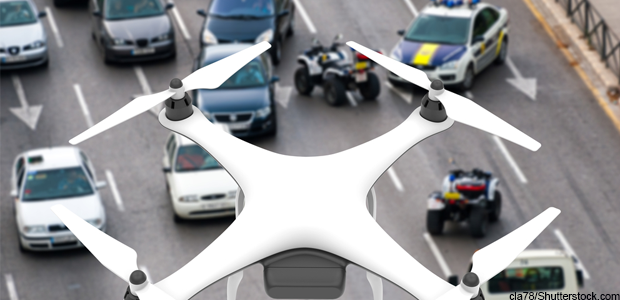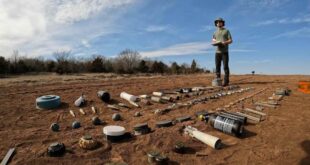Unmanned Systems
U.S. drone developers feel squeeze during pandemic
The economic collapse triggered by the COVID-19 pandemic is hindering some the DOD’s efforts to foster development of a domestic commercial drone industry, according to one of the agency’s managers for a federal effort to support that effort.
“We’re working with the Small Business Administration on the Paycheck Protection Program” to help small companies developing technologies, including unmanned aircraft, under a DOD fostering program, said Jennifer Santos, DOD deputy assistant secretary of defense, industrial policy, during a May 6 C4ISRNET conference conducted virtually.
Santos said she has walked companies that make small UAS, as well as other emerging technology start-ups, through the SBA’s PPP program in the last few weeks.
“Companies say they need help. I determine which levers to turn” to help them, she said. “The aircraft industry in general is struggling” in the economic wake of the pandemic shutdown, she added.
Santos oversees the DOD’s Trusted Capital Marketplace, created under the 2018 National Defense Authorization Act to give small and medium sized companies developing emerging technologies access to private capital from vetted sources to avoid foreign investment.
DOD’s efforts to foster drone development in the U.S. are moving, with multiple teleconferences weekly industry trade associations about funding issues, Santos said.
She said the first Trusted Capital Marketplace event in November in conjunction with Texas A&M University drew many companies looking for capital to develop the vehicles. She has held several teleconference events since, as the coronavirus pandemic shut down planned in-person events such as South by Southwest and AUSA conferences where she planned to exhibit.
The market for small and medium-sized commercial drones is dominated by Chinese drone makers, said Brent Ingraham, unmanned systems technical director for the undersecretary of defense for acquisition and sustainment platform and Weapons Portfolio Management. Chinese makers of small drones hold 90% of the market for small, inexpensive, off-the-shelf, UAS in the U.S., he said, with DJI holding 70% of that.
The federal government, including agencies such as the Department of Homeland Security, as well as the DOD, worry Chinese-made drones aren’t secure. Federal agencies have officially grounded their Chinese-made small- and medium-sized drones out of cybersecurity fears, particularly the concern that data from cameras and sensors is downloaded to overseas servers.
DJI has repeatedly and strongly denied those accusations.
“Foreign-built drones have the potential to introduce security and supply chain threats,” said Essye Miller, principal deputy, Department of Defense CIO, said at the virtual conference.
Miller said the Army has progressed on a trial of its common small UAS architecture. The Army, she said, has selected five vendors that will use DOD’s “Blue UAS” architecture in a trial to develop drone reconnaissance aircraft. “Foreign-built drones have the potential to introduce security and supply chain threats,” she said.
The Blue UAS architecture, Ingraham explained, will develop an open-source, industry standard for small drone command and control capabilities that will allow manufacturers to snap in new software for new capabilities, in a more agile fashion, instead of pushing through a long development time line.
This article first appeared on FCW, a partner site of Defense Systems.
About the Author

Mark Rockwell is a senior staff writer at FCW, whose beat focuses on acquisition, the Department of Homeland Security and the Department of Energy.
Before joining FCW, Rockwell was Washington correspondent for Government Security News, where he covered all aspects of homeland security from IT to detection dogs and border security. Over the last 25 years in Washington as a reporter, editor and correspondent, he has covered an increasingly wide array of high-tech issues for publications like Communications Week, Internet Week, Fiber Optics News, tele.com magazine and Wireless Week.
Rockwell received a Jesse H. Neal Award for his work covering telecommunications issues, and is a graduate of James Madison University.
Click here for previous articles by Rockwell.
Contact him at [email protected] or follow him on Twitter at @MRockwell4.
https://defensesystems.com/articles/2020/05/06/drone-development-covid-rockwell.aspx
 Unmanned Aerial Vehicle The latest drone news
Unmanned Aerial Vehicle The latest drone news




